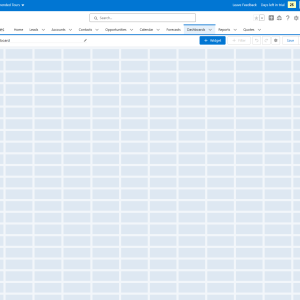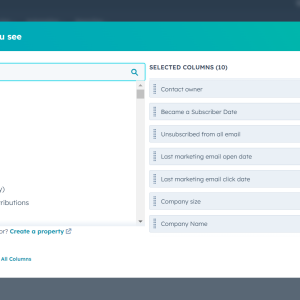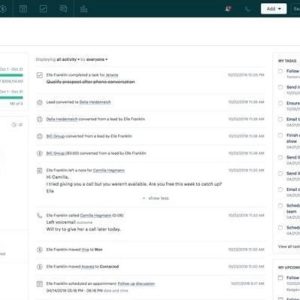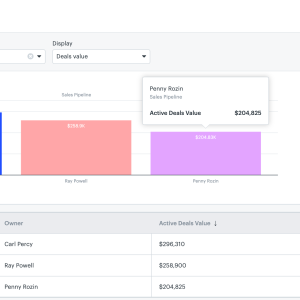In the fast-paced world of sales, having efficient and effective management software is crucial for success. As we enter the year 2023, numerous advancements in technology have revolutionized the way sales teams operate. From streamlining processes to improving productivity, the best sales management software of 2023 offers a plethora of features designed to optimize sales performance. In this article, we will explore some of the top sales management software options available in 2023, highlighting their key features and benefits. Whether you are a small business owner or a sales manager in a large corporation, this comprehensive guide will help you make an informed decision when choosing the best sales management software for your team.
Our research shows that Zoho CRM is the best sales management software, thanks to its large sales feature catalog and flexible, low-cost pricing plans.
You are viewing: Best Sales Management Software of 2023
There’s a lot to keep track of when it comes to sales, and every lost piece of information could result in a squandered conversion. That’s why the right sales management software can make a big difference, as long as you can find a good fit for your business.
In this guide, we’ve collected some of the best sales management software to help you make the right decision. Check them out below:
Don’t forget you can always check out our CRM comparison page to get more information about your options, and keep scrolling to learn more about these sales management software providers.
Top Sales Management Software
If you’re in the market for sales management software, you’ve got a lot of excellent options to choose from. Here are the best sales management software providers, according to our in-depth research.
- Zoho CRM – Best sales management software overall
- Freshsales Suite – Best for ease of use
- HubSpot CRM – Best for growing businesses
- monday CRM – Best for customization
- Pipedrive – Good low cost alternative
Zoho CRM – Best overall sales management software
It’s hard to beat Zoho CRM when it comes to sales management software. For starters, it’s considered one of the more scalable options on this list, offering the most pricing plans at reasonable prices, so the platform can grow along with your business.
Additionally, you’ll find plenty of team management features, like a unified inbox and team calendar, and security tools, like multi-factor authentication and IP restriction.
On top of all that, Zoho CRM doesn’t just offer sales functionality; there’s also customer service and marketing tools available, so you can really branch out if you need to.
As far as sales specific features go, Zoho CRM knocks it out of the park with more lead capture features than any other option on this list, including social listening, web forms, and website visitor across all paid plans, and a website chatbot available in the most expensive plan. You’ll also get sales forecasting functionality, but only if you pay at least $40 per user, per month.
Zoho CRM is also a fairly customizable platform, as long as you’re willing to pay a bit extra. Options like custom task types and custom objects are relegated to the Enterprise and above plans, so you’ll have to pay at least, $40 per month.
If you have any trouble, customer support is quite responsive as well, with phone, email, chat, knowledge base, and community forum options across all paid plans. You can even get 24/7 coverage if you’re willing to opt for the Ultimate or Plus plans.
In addition to the best sales management software, we found Zoho CRM to be the best contact management software and the best CRM for small businesses. Suffice to say, Zoho CRM is one of the best of the best.
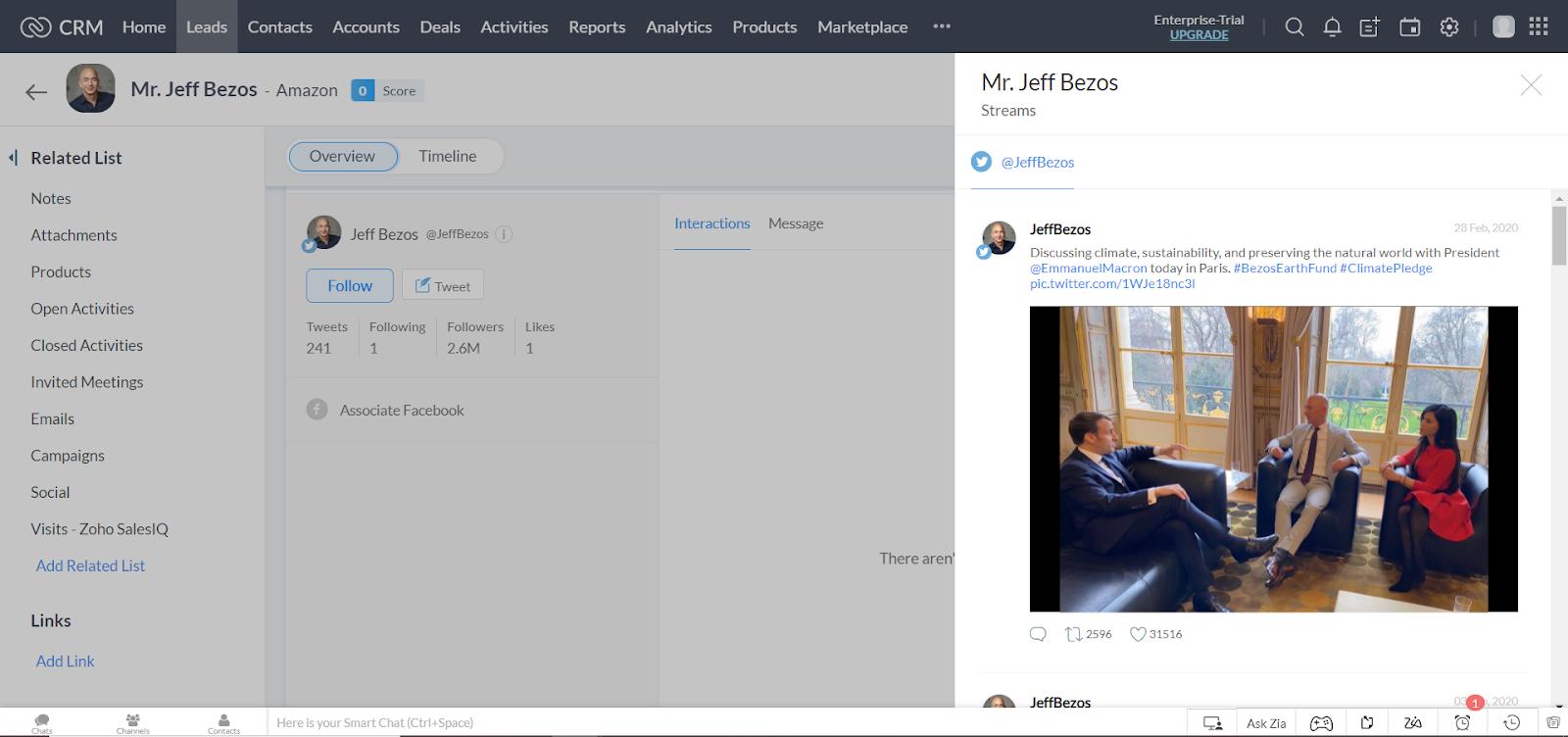
Social tabs in Zoho CRM
Image: Techfuzzy testing
Zoho CRM pricing
Zoho CRM offers the most pricing plans on this list, with five pricing plans and a free forever plan.
The Standard plan costs $14 per user, per month, the Professional plan costs $23 per user, per month, the Enterprise plan costs $40 per user, per month, the Ultimate plan costs $52 per user, per month, and the Plus plan costs $57 per user, per month.
Zoho CRM also offers a free forever plan, although it offers very little in the way of sales features beyond email templates and a single web form. You do get access to a customizable sales pipeline, but no lead scoring or other valuable tools in the paid plans.
Check out our Zoho CRM pricing guide for more information
Freshsales – Easiest software to use
If you’re a newbie to business software and want to make sure ease of use is built into the platform, your best bet for sales management software is likely Freshsales, the easist to use CRM in our research. This intuitive sales solution was the quickest to set up across our research, so you’ll have no trouble navigating your sales management tasks.
On top of all that ease of use, Freshsales also offers robust functionality, scoring in the top three for all major sales features, including lead capture, lead communication, and lead conversion. You’ll even get access to some great contact management tools, including communication history and list segmentation across all plans, even the free one.
Freshsales is great for help and support as well, offering all major channels across every single plan, including the free plan, so you can reach out however you need. You won’t get 24/7 coverage, though, but hopefully you won’t need it with a platform this simple to use.
The only downside to Freshsales that kept it out of the top spot is its lack of scalability. Unlike Zoho CRM, it offers only three paid plans that top out at $69 per user, per month, so the platform is pretty limited for larger businesses. Plus, you won’t get some advanced security features like IP restriction, which can hinder long-term viability as a platform. Still, it does offer integrations with other Freshworks services like Freshmarketer and Freshdesk, so you branch out if you need to.

Contact profile in Freshsales
Image: Techfuzzy testing
Freshsales pricing
See more : 12 Benefits of CRM Software Every Business Should Know
Freshsales offers three pricing plans and a free forever plan.
The Growth plan costs $15 per user, per month, the Pro plan costs $39 per user, per month, and the Enterprise plan costs $69 per user, per month.
As for the free plan, you can get access to the Growth plan at no cost as long as you have three users or less. Once, you go beyond that threshold, you’ll have to start paying the monthly per user rate.
HubSpot CRM – Best for growing businesses
Speaking of scalability, if you’re a growing business that expects to reach some serious enterprise-level success, HubSpot can handle your sales management software needs. This provider is built for growth, offering lots of customizability, plenty of security, and tools for team management.
Speaking of scalability, the HubSpot Sales Hub is the dedicated sales management software in the HubSpot ecosystem, with the provider offering a wide range of other tools, including a Suite package that combines sales, marketing, and customer support into a single platform. Our research even found that HubSpot is the best CRM for marketing, if you’re looking for that dual threat combination.
For sales, though, HubSpot performs admirably, with the best lead conversion features in our research. This includes customizable sales pipelines and quote proposal management tools across all plans, even the free one. You’ll also get access to lead score and the ability to add products to deals, although those features are relegated to the more expensive plans that start at $90 per user, per month.
Help and support options are robust as well, with email, chat, knowledge base, and community forum options for all paid plans, and the ability to add phone in the more expensive plans. No 24/7 coverage here, though, no matter how much you pay.

Contacts list in HubSpot
Image: Techfuzzy testing
HubSpot CRM pricing
HubSpot offers three different pricing plans and a free forever plan.
The Starter plan costs $22.50 per user, per month, the Professional plan costs $90 per user, per month, and the Enterprise plan costs $120 per user, per month.
The free plan from HubSpot is definitely better than the free plan from Zoho CRM or Freshsales Suite, offering a surprisingly good set of features that can get you started as a small business. You’ll likely have to upgrade as your business grows, but for now, it makes for an extended free trial that can get your business organized and automated.
Check out our HubSpot CRM pricing guide for more information
monday.com – Best for customization
Customizability can go a long way for a business, particularly if their sales process is a bit unorthodox. Fortunately, monday CRM offers a flexible platform that can be tailored to your specific needs. Custom fields, custom tasks, and customizable sales dashboards can all be found in this platform, all at a low price ($10 per user, per month) that beats almost every option on this list except HubSpot.
For sales features, though, we have to admit that monday CRM isn’t stellar. It has virtually no lead communication tools, and its lead conversion and lead capture features were definitely not up to par compared to the likes of Zoho CRM, offering only web forms and customizable sales pipeline. You can get access to lead scoring, but only in the most expensive plan, which is still only $24 per user, per month.
For help and support, monday CRM is lacking a bit, offer now chat or phone opportunities for any of its five plans, but you will give access to email options, although it’s not 24/7, so you better shoot your shot during business hours. There’s always the community forum and knowledge base though!
All in all, monday CRM is great for smaller businesses with a tight budget that may have an unconventional strategy for their sales team, as the platform can be customized as you see fit at a low price. Still, if robust sales functionality is your goal, looking elsewhere might be your best bet.

Web form in monday CRM
Image: Techfuzzy testing
monday CRM pricing
For pricing, monday CRM offers three different pricing plans.
The Basic plan costs $10 per user, per month, the Standard plan costs $14 per user, per month, and the Pro plan costs $24 per user, per month.
As you can tell, monday CRM does not offer a free forever plan, but the 14-day free trial can let you get access to the platform and test it out before you decide to buy.
Check out our monday CRM review guide for more information
Pipedrive – Good low-cost alternative
If for some reason the above options are not a good fit for you, Pipedrive may be the sales management software for you. It’s a great middle-of-the-pack option, providing solid features at a reasonable price in a fairly intuitive interface for beginners and experts alike.
Sales features are there, including website live chat, customizable sales pipeline, and the ability to add products to deals. However, a lot of features require add-ons, which is where the low-cost can bite you in the butt. Website live chat, web forms, and website visitor tracking all cost extra, which can be a dealbreaker if you need that advanced functionality.
Help and support is one of the spots where Pipedrive really shines, as one of the only providers offering 24/7 live chat support for all plans. You won’t get phone access until you pay for the Enterprise plan, though, and email is not available at all, so hopefully live chat vibes well with your needs.
See more : Best Examples of Sales Dashboards for CRM
Overall, Pipedrive doesn’t do anything better than any other option on this list. It’s more expensive than HubSpot, it offers less features than Zoho CRM, and it’s not as easy to use as Freshsales Suite. Still, if the others don’t suit your needs and you need a jack of all trades and a master of none, Pipedrive is the way to go.

Deals page in Pipedrive
Image: Techfuzzy testing
Pipedrive pricing
Pipedrive offers four different pricing plans for businesses in need of sales management software.
The Essential plan costs $14.90 per user, per month, the Advanced plan costs $24.90 per user, per month, the Professional plan costs $49.90 per user, per month, and the Enterprise plan costs $99 per user, per month.
Like monday CRM, Pipedrive does not offer a free plan, but you can get a 14-day free trial for all paid plans to test it out before you buy.
Check out our Pipedrive pricing guide for more information
Most Important Sales Management Features
Now that you know which sales management software providers are best suited to handle your particular needs, it’s time to understand exactly what kind of features you can find within these platforms. After all, sales management software is only as good as the features used to manage your sales.
The most important sales management features can be grouped into three different categories: lead capture, lead communication, and lead conversion.
Lead Capture
Lead capture describes features that are used to gain new data in regard to potential customers. Here are some features that are great at improving lead capture:
- Social listening – These features can monitor your social channels and see what kind of customers are talking about your brand.
- Website visitor tracking – This tool is designed to analyze how visitors interact with your website.
- Website chatbot – This feature describes a chatbot that operates on your web page to answer basic questions customers might have.
- Web forms – These landing pages are designed to have customers fill out a form with pertinent information like location and email address.

Lead capture web form from monday CRM
Image: Techfuzzy testing
Lead Communication
Once you’ve captured some lead data, the next step is communicating with your leads, which is where these features come in handy. Here are a few lead communication features that you’ll want to look out for in your sales management software:
- Video conferencing tools – This feature allows for users to communicate with customers via video conferencing tools like Google Meet and Zoom.
- Email templates – The functionality describes the templates that can be used to send emails to potential customers.
- Website live chat – Like lead capture, website live chat is a tool that can be used by customers to talk directly to your team on your website.
- Native VoIP – Voice over Internet Protocol allows for audio calls over the internet, which you can use to stay in touch with your leads.
- Instant messaging – This feature allows for your team to communicate with leads through instant messaging apps like WhatsApp and Messenger.
- Auto-response – These features help you automate responses to basic questions, so your team can focus on other, more granular needs.
Lead Conversion
Arguably the most important step in the lead management process is the conversion, which describes actually making a sale to a customer. Here are some lead conversion features that will help you close the deal:
- Customizable sales pipeline – This describes a platform’s ability to create a tailored sales pipeline that will show you the entire process from capture to conversion.
- Lead scoring – This function scores your leads in a way that can help you understand which are ripe for a sale and which ones may need a little love.
- Quote proposal management – These tools will help you keep track of quote proposals in the platform.
- Accept payments – These features will allow your sales management software to actually accept payments in the platform.
Methodology: How We Test Sales Management Software
We take our impartial research and analysis seriously, so you can have complete confidence that we’re giving you the clearest, most useful recommendations.
After conducting an initial exploration to identify the most relevant, popular, and established tools in the market, we put them through their paces with hands-on testing to see their real strengths and weaknesses. In this case, we put 13 CRM systems to the test across 84 areas of investigation.
Based on years of market and user needs research, we’ve established a CRM testing methodology that scores each product in six main categories of investigation and 13 subcategories; this covers everything from the available features and scalability capacity to the product’s value for money, and much more.
Our main testing categories for CRM systems are:
Features: the functionalities and capabilities provided by the CRM software, such as contact management, lead and opportunity tracking, and task and activity management.
Help and Support: the resources and assistance available to users when they encounter issues or require guidance while using the CRM software.
Customisation: the ability to tailor the CRM software to suit the specific needs and processes of the organization, e.g. customizing fields, layouts, and workflows.
Scalability: the ability of the CRM software to accommodate the growth and changing needs of the organization, such as the capacity to handle a growing customer database.
Price: the cost associated with using the CRM software. It includes factors such as licensing fees, subscription plans, and additional charges for add-on modules or features.
Team Structure – Sales CRM: determining if a platform makes it easier to manage large sales teams, including team dashboards, team hierarchies, and team inboxes.
Usability – Small Business CRM: assessing the simplicity of the interface, the ease of navigating through menus and options, and the overall user experience.
When it comes to calculating a product’s final score, not all testing areas are weighted evenly, as we know some aspects matter more to our readers than others, which are merely “nice to have.” After hundreds of hours, our process is complete, and the results should ensure you can find the best solution for your needs.
At Techfuzzy, we have a number of full time in-house researchers, who re-run this testing process regularly, to ensure our results remain reflective of the present day
Learn more about our research.
That’s a wrap on “ Best Sales Management Software of 2023 ” We hope you’ve found a trove of useful insights and fresh perspectives. Your opinions and ideas matter to us—join the conversation below and share your take! Hungry for more tech insights? Dive into our diverse collection of articles where innovation meets practicality. Discover More CRM Softwares.
Stay in the loop with the latest in AI and tech – your journey into the digital future continues at techfuzzy.com.
#Sales #Management #Software
Source: https://techfuzzy.com
Category: CRM
